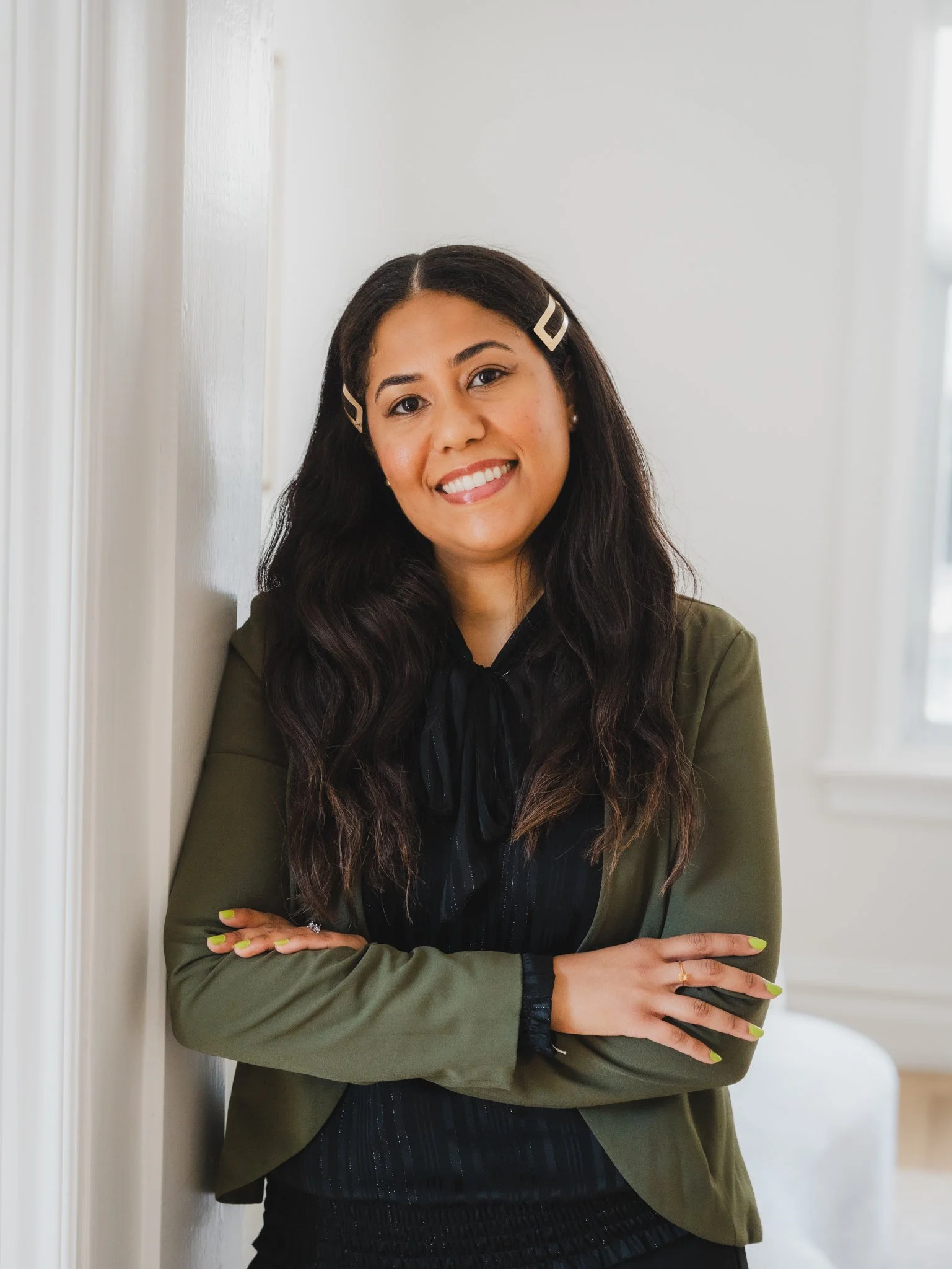
Nūrish Psychotherapy - Your Expert OCD Therapist Ottawa
At Nūrish Psychotherapy we help you regain control and overcome intrusive thoughts and compulsions. Meet our specialized OCD therapist Ottawa trusts.
What Is OCD and How It Affects You?
Obsessive-Compulsive Disorder (OCD) is a complex mental health condition characterized by intrusive thoughts, images, or urges (obsessions) and repetitive behaviors (compulsions) performed to relieve anxiety. While everyone has unusual thoughts occasionally, OCD causes these thoughts to feel relentless, leading to compulsions that disrupt daily life.
For example, someone with OCD may wash their hands excessively to reduce a fear of contamination or may repeatedly check locks to prevent imagined dangers. This pattern can become a cycle of distress and relief, one that becomes harder to break without help from an OCD therapist. If these behaviors and thoughts feel overwhelming, know that support is available — and that treatment is possible.
Why Choose Our OCD Therapist in Ottawa?
Our team of compassionate, highly-trained OCD therapists in Ottawa are dedicated to providing personalized treatment for OCD. We specialize in evidence-based therapies, including Exposure and Response Prevention (ERP) and Cognitive Behavioral Therapy (CBT), which are proven to reduce symptoms and help clients regain control. Our therapists understand that each person's experience with OCD is unique, and we tailor our approach to fit your specific challenges and goals.
With years of experience, a client-centered approach, and deep expertise in OCD treatment, we are here to guide you on the path to recovery. By choosing our OCD therapists in Ottawa, you’re choosing a team that values empathy, excellence, and a commitment to helping you overcome OCD.
Our OCD Treatment Approach: Personalized Therapy for Long-Lasting Results
Our OCD treatment provided by a dedicated OCD therapist is structured to provide a comprehensive, compassionate approach to help you break the cycle of obsessions and compulsions.
-
Exposure and Response Prevention (ERP): ERP therapy involves gradually exposing you to anxiety-provoking thoughts or situations (exposures) while helping you resist the urge to engage in compulsive behaviors (response prevention). With support, ERP helps you learn that you can face distressing thoughts without needing rituals, helping to reduce anxiety over time.
Cognitive Behavioral Therapy (CBT): CBT helps you identify unhelpful thought patterns and replace them with healthier coping mechanisms. It’s especially effective for those experiencing high levels of anxiety linked to OCD.
Acceptance and Commitment Therapy (ACT): ACT can be beneficial for learning to accept intrusive thoughts without judgment and reducing the impact of OCD symptoms on your daily life.xt goes here
Our OCD therapists will guide you through each step, ensuring that you’re supported as you work toward a life free from the limitations of OCD. For those seeking alternative or adjunctive approaches to traditional therapy, we offer treatment for OCD for people that are interested in treating it without medical intervention or in conjuction with medication and therapy.
Conditions Our OCD Therapists in Ottawa Treat: What To Expect
-
Contamination OCD: Fear of germs or uncleanliness, leading to excessive washing or cleaning.
Harm OCD: Intrusive thoughts about causing harm to oneself or others, often leading to checking or avoidance behaviors.
Relationship OCD: Persistent doubts about one’s partner or relationship, resulting in reassurance-seeking and other compulsions.
Perfectionism and Order OCD: Intense need for symmetry or order, such as arranging items until they feel “just right.”
If you or a loved one experiences any of these symptoms, know that help is available. Our personalized OCD treatment can address these challenges and offer you tools to manage them effectively.
OCD Self-Help Resources and Recommended Reading
-
Books:
Getting Over OCD: A 10-Step Workbook for Taking Back Your Life by Jonathan Abramowitz
The Imp of the Mind: Exploring the Silent Epidemic of Obsessive Bad Thoughts by Lee Baer
Online Resources:
International OCD Foundation – Comprehensive information and support
OCD Action – Support for those living with OCD
These resources complement your therapy journey, providing additional insights into managing OCD symptoms effectively.
Therapists Specializing in OCD Therapy
-

EMILY LIGHT
REGISTERED PSYCHOTHERAPIST
(QUALIFYING)
Children, Teens, & adults (5+)
CBT, ACT, ERP & Motivational Interviewing
Anxiety, Depression, Trauma, OCD, ADHD, Eating Disorders, Intergenerational Trauma, & Self-esteem Challenges
-

SARA ORSINI
REGISTERED PSYCHOTHERAPIST
(QUALIFYING)
Teens & Adults (12+)
EMDR, CBT, DBT, ERP, Psychodynamic Therapy, & Mindfulness
Anxiety, OCD, ADHD, Trauma, Self-esteem, Relationship Challenges, Burnout, Intergenerational Trauma, & Eating Disorders
-

EMELIE SATTARATN
REGISTERED PSYCHOTHERAPIST
(QUALIFYING)
Adolescents, Adults, Couples & Families (10+)
DBT, CBT, ERP & Polyvagal Theory
OCD, ADHD, Life Transition, Burnout, Interpersonal Relationships, Intergenerational Trauma, & Trauma

Book a session
Lets start the journey of healing together.
OCD Therapist Ottawa Frequently Asked Questions (FAQs)
-
An OCD therapist can provide specialized treatments that address both obsessive thoughts and compulsive behaviors. The primary, evidence-based therapy for OCD is Exposure and Response Prevention (ERP), a type of Cognitive Behavioral Therapy (CBT). ERP gradually exposes individuals to their triggers while teaching them to resist compulsive responses, ultimately helping to reduce anxiety and control OCD symptoms. In addition to ERP, therapists may also use Acceptance and Commitment Therapy (ACT) and Inference-Based Cognitive Behavioral Therapy (I-CBT), which help clients shift their perspective on intrusive thoughts and reduce compulsive urges. These methods provide a structured and effective approach to managing OCD.
-
Yes, effective OCD treatment requires additional specialized training. Therapists who focus on OCD often undergo specific training in therapies like Exposure and Response Prevention (ERP), which is the gold standard in OCD treatment. This training ensures that they can skillfully guide clients through the nuanced techniques involved in managing intrusive thoughts and compulsions. Additionally, OCD therapists stay informed about the latest research and best practices, so they can provide evidence-based, effective treatment tailored to each client’s needs.
-
A typical OCD treatment plan begins with a thorough assessment of symptoms, followed by a customized approach to address both the nature and severity of the OCD. The primary components of an OCD treatment plan usually include ERP exercises and regular sessions with an OCD specialist, who guides clients through exposure practices that target specific triggers. Over time, clients learn to resist compulsions, reducing their dependency on rituals to feel safe. An OCD specialist will provide the skills, structure, and support needed to help clients regain control and experience lasting relief from OCD symptoms.
-
While an OCD therapist can’t completely eliminate intrusive thoughts, therapy can significantly reduce the impact these thoughts, images, and urges have on your life. Through Exposure and Response Prevention (ERP) and Cognitive Behavioral Therapy (CBT), an OCD therapist helps you view intrusive thoughts as harmless mental events rather than threatening experiences. Over time, this reframing process can reduce both the frequency and intensity of intrusive thoughts, enabling you to live more comfortably and confidently.
-
No, there’s no strict age limit for receiving OCD treatment. OCD therapy can be effective for people of all ages, including children, teens, and adults. Treatment approaches may be adjusted depending on age; for example, younger clients might engage in play-based ERP techniques, while adults typically follow structured ERP practices. At our clinic, we offer OCD therapy for various age groups, ensuring that every client receives age-appropriate support for overcoming OCD symptoms.
-
No, it’s not obligatory to have in-person sessions for OCD treatment. Many OCD therapists offer virtual therapy, including ERP, which is just as effective online. Teletherapy allows clients to work on their OCD symptoms from the comfort of home while receiving the same professional guidance and support as in-person sessions. Personally, our team provides both options to ensure accessibility and convenience, so clients can choose what best suits their needs.
-
Yes, medications such as Selective Serotonin Reuptake Inhibitors (SSRIs) are commonly prescribed for OCD to help manage symptoms, especially when combined with therapy like ERP. However, only medical doctors, such as psychiatrists, can prescribe medication. An OCD therapist cannot prescribe medication but can work collaboratively with your doctor or psychiatrist to create a comprehensive treatment plan that includes both therapy and, if needed, medication.
-
In your first session with an OCD therapist, you can expect a welcoming, nonjudgmental environment where the therapist will ask about your symptoms, triggers, and treatment goals. They’ll explain how OCD treatment works, including an overview of therapies like ERP and CBT. This initial session is an opportunity to discuss your concerns, learn about the therapy process, and establish a foundation for future sessions. By the end of the first session, you should have a clear understanding of the next steps and feel confident in the therapist’s approach to helping you manage OCD.






